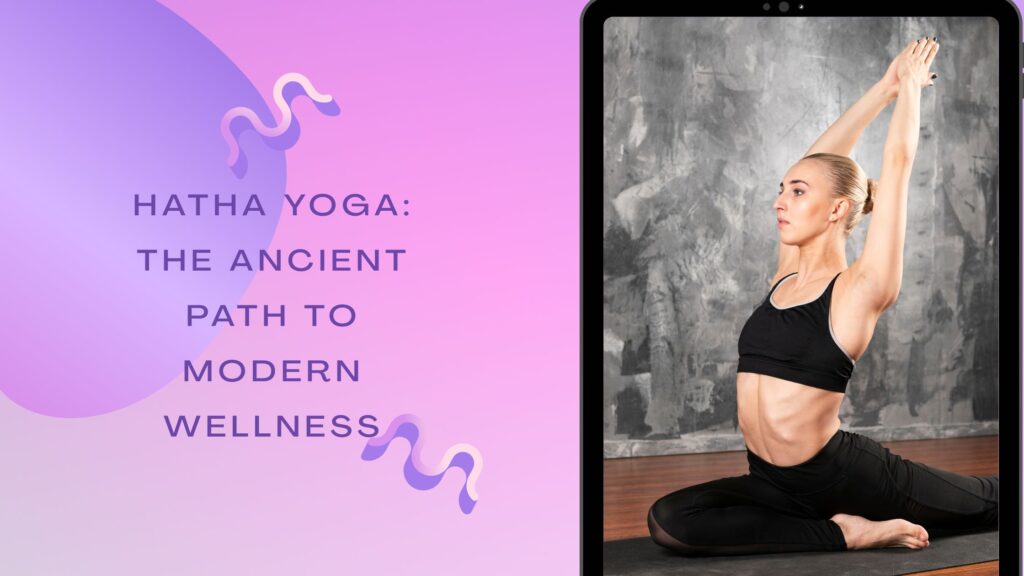In a world where stress, screen time, and sedentary routines dominate our daily lives, more people are turning to ancient practices to find balance, clarity, and strength. One such time-tested approach is Hatha Yoga is a gentle yet powerful style of yoga that helps align the body, mind, and breath.
Whether you’re completely new to yoga or looking to deepen your understanding, this comprehensive guide will walk you through everything you need to know about Hatha Yoga, including its meaning, benefits, poses, philosophy, and how to begin your own practice today.
Hatha Yoga, rooted in ancient Indian tradition, provides a comprehensive path to well-being by combining physical postures (asanas), breathing exercises (pranayama), and meditation. It focuses on harmonizing the body, mind, and spirit, encouraging inner peace and supporting overall health. Today, modern science continues to acknowledge the wide-ranging physical and mental benefits of Hatha Yoga, such as increased flexibility, enhanced strength, reduced stress, and better cardiovascular function.
Table of Contents
What is Hatha Yoga?
Hatha Yoga is often referred to as the foundation of all modern yoga styles. The word “Hatha” is derived from the Sanskrit terms Ha meaning “sun” and Tha meaning “moon.” This represents the dual energies within us active and receptive, masculine and feminine, dynamic and calming. The practice of Hatha Yoga aims to bring these opposites into harmony through physical postures (asanas), breathwork (pranayama), and meditation.
Unlike faster-paced forms such as Vinyasa or Power Yoga, Hatha Yoga emphasizes slower movements, deep breathing, and longer-held poses. This makes it one of the most accessible forms of yoga, especially for beginners or those seeking a more mindful, meditative experience.
Hatha Yoga Meaning in Today’s World
In the modern yoga community, “Hatha Yoga” is often used to describe classes that focus on basic postures and alignment. While it may seem simple, its effects are profound. It lays the groundwork for a deeper understanding of both the body and the mind, making it an ideal practice for those new to yoga or anyone seeking stress relief and inner peace.
The Philosophy Behind Hatha Yoga
At its core, Hatha Yoga is about balance not just physically, but emotionally and energetically. The practice integrates three key elements:
1. Asanas (Postures)
Each pose is designed to strengthen and stretch different parts of the body while also preparing the practitioner for meditation. Asanas improve flexibility, balance, and posture.
2. Pranayama (Breath Control)
Breathing techniques in Hatha Yoga help regulate the flow of life force (prana) in the body. Controlled breathing calms the nervous system, reduces anxiety, and increases focus.
3. Dhyana (Meditation)
Hatha Yoga prepares the body and mind for meditation. This quiet inner reflection allows you to connect with your higher self and promotes emotional clarity.
A Practice of Union
Ultimately, Hatha Yoga is a path to unifying the body, breath, and mind. By doing so, practitioners can experience not only better physical health but also spiritual awakening and self-awareness.
Hatha Yoga Poses for Beginners
If you’re new to yoga, don’t worry Hatha Yoga poses are generally beginner-friendly and adaptable to all fitness levels. Here are a few basic postures you might encounter in a typical class:
1. Mountain Pose (Tadasana)
This foundational pose helps with posture and grounding. It teaches you how to align your body and engage your core.
2. Downward Facing Dog (Adho Mukha Svanasana)
A gentle inversion that strengthens the arms, stretches the back, and energizes the body.
3. Cobra Pose (Bhujangasana)
This backbend opens the chest and shoulders, improving flexibility in the spine and boosting confidence.
4. Tree Pose (Vrikshasana)
A balancing pose that enhances concentration and strengthens the legs and core.
These poses are usually held for several breaths, allowing time to connect with your body and breath. Over time, you’ll build strength, stability, and mindfulness through consistent practice.
Benefits of Hatha Yoga
The benefits of Hatha Yoga are both immediate and long-lasting. Whether you’re looking to reduce stress, improve your flexibility, or simply feel better in your body, Hatha Yoga offers something for everyone.
1. Physical Benefits
- Improves flexibility and range of motion
- Builds muscular strength and endurance
- Enhances posture and body awareness
- Boosts energy levels and vitality
2. Mental and Emotional Benefits
- Reduces stress and anxiety
- Promotes relaxation and better sleep
- Improves concentration and mental clarity
- Encourages emotional balance and resilience
3. Scientific Support
Numerous studies have shown that Hatha Yoga can help lower blood pressure, improve heart health, and manage symptoms of depression and anxiety. Its emphasis on breath control and mindfulness makes it a powerful tool for holistic health.
Read more: Hot Yoga: Benefits, Risks, and Why Everyone’s Sweating Over It
Read more: Discover the Perfect Yoga Studio for Your Mind, Body & Soul

What to Expect in a Hatha Yoga Class
Attending your first Hatha Yoga class can feel both exciting and intimidating—but there’s no need to worry. Hatha is known for its gentle pace and welcoming atmosphere.
Class Structure
A typical session includes:
- Gentle warm-up stretches
- A sequence of yoga poses held with awareness
- Breathwork exercises (pranayama)
- A final relaxation (Savasana)
Tips for Beginners
- Wear comfortable, breathable clothing
- Bring a yoga mat and water bottle
- Arrive early to settle in and inform the teacher of any injuries
- Focus on your breath and avoid comparing yourself to others
Remember, Hatha Yoga is not a competition. It’s a personal journey toward self-care and mindfulness.
Hatha Yoga vs Other Styles: What’s the Difference?
With so many yoga styles out there, it’s easy to get overwhelmed. Let’s break down how Hatha Yoga compares to some of the more popular options:
Hatha Yoga vs Vinyasa
- Hatha: Slower pace, focus on alignment, great for beginners
- Vinyasa: Flowing movements synchronized with breath, more dynamic and physically intense
Hatha Yoga vs Ashtanga
- Hatha: Adaptable and beginner-friendly
- Ashtanga: Rigid sequence, demanding and disciplined
Hatha Yoga vs Yin Yoga
- Hatha: Balanced practice with movement and breath
- Yin: Long-held passive stretches, targets deep connective tissues
If you’re just starting out or looking for a more meditative practice, Hatha Yoga is a great place to begin.
| Section | Details |
| Meaning of Hatha Yoga | “Ha” means sun, “Tha” means moon; aims to balance body, mind, and breath |
| Philosophy | Involves asanas (postures), pranayama (breath control), and meditation |
| Common Poses (Asanas) | Tadasana (Mountain), Adho Mukha Svanasana (Downward Dog), Bhujangasana (Cobra), Vrikshasana (Tree) |
| Physical Benefits | Improves flexibility, strength, posture, and energy levels |
| Mental Benefits | Reduces stress, enhances focus, promotes emotional balance |
| Hatha vs Vinyasa | Hatha: slower, static poses; Vinyasa: dynamic, flowing movements |
| Beginner Tips | Wear comfortable clothes, focus on breath, start slow, use props as needed |
| Practice at Home | 15–30 minutes daily, use online resources, focus on form and breath |
| Lifestyle Integration | Practice mindfulness, eat healthy, rest well, and align daily habits with yoga principles |
| Ideal For | Beginners, seniors, those seeking stress relief or a gentle yoga style |
How to Start a Hatha Yoga Practice at Home
You don’t need a fancy studio or equipment to practice Hatha Yoga. A quiet space, a yoga mat, and a willingness to tune into your body are enough.
1. Create a Routine
- Start with 15–30 minutes a day
- Choose a few poses to focus on
- Include 5 minutes of breathwork and meditation
2. Use Online Resources
Many apps and YouTube channels offer free Hatha Yoga for beginners classes. Just make sure the instruction aligns with safe and mindful practice.
3. Listen to Your Body
Never push through pain. Hatha Yoga is about honoring where you are, not forcing results.
Living the Hatha Yoga Lifestyle
The beauty of Hatha Yoga is that it extends far beyond the mat. Incorporating its principles into your daily life can lead to profound transformation.
Mindfulness in Action
Practice being fully present while eating, walking, or working. Use your breath to stay calm and focused.
Healthy Habits
Pair your yoga routine with nourishing food, restful sleep, and digital detoxes to maximize its benefits.
Inner Peace
As you develop your practice, you may notice a deeper connection to your inner self. Hatha Yoga teaches us that true wellness comes from within.
Final Thoughts: Is Hatha Yoga Right for You?
If you’re seeking a practice that promotes physical health, emotional balance, and mental clarity, Hatha Yoga is an excellent choice. Its accessibility, versatility, and rich tradition make it suitable for virtually everyone—regardless of age, fitness level, or experience.
So why wait? Whether you step into a studio, roll out your mat at home, or try a guided video online, now is the perfect time to begin your journey with Hatha Yoga.
Let this ancient practice guide you toward a more balanced, peaceful, and empowered life—one breath, one pose, and one mindful moment at a time.
FAQ:
Q. What is Hatha Yoga and how is it different from other styles?
Ans: Hatha Yoga is a traditional form of yoga that focuses on balancing the body and mind through physical postures (asanas), breathing techniques (pranayama), and meditation. Unlike Vinyasa or Power Yoga, it follows a slower pace and emphasizes alignment, mindfulness, and longer-held poses—making it ideal for beginners.
Q. What are the main benefits of practicing Hatha Yoga?
Ans: Hatha Yoga offers a wide range of physical and mental benefits including improved flexibility, better posture, increased strength, reduced stress, enhanced mental clarity, and emotional balance. It also supports overall wellness and can complement a healthy lifestyle.
Q. Is Hatha Yoga good for beginners?
Ans: Yes, Hatha Yoga is one of the best yoga styles for beginners. Its slow and steady approach allows new practitioners to learn proper form, breathing, and body awareness without feeling rushed or overwhelmed.
Q. How often should I practice Hatha Yoga?
Ans: For best results, practicing Hatha Yoga 3–5 times per week is ideal. However, even short daily sessions of 15–30 minutes can lead to noticeable improvements in flexibility, focus, and stress levels.
Q. Can I do Hatha Yoga at home without a teacher?
Ans: Absolutely. Hatha Yoga is beginner-friendly and can be practiced at home using online videos or guided apps. Just be sure to focus on proper alignment, listen to your body, and progress gradually.
Q. What are the 7 stages of Hatha Yoga?
Ans: The Gheranda Samhita outlines a unique sevenfold path of yoga not found in other Hatha yoga texts. These seven practices are: Shatkarma, Asana, Mudras, Pratyahara, Pranayama, Dhyana, and Samadhi. The text is divided into seven chapters, with particular emphasis placed on the ṣaṭkarmas (cleansing techniques).
Q. What is the path of Hatha Yoga?
Ans: Hatha Yoga represents the physical practice on the path to Self-Realization. The body serves as the vehicle that carries the Self through its journey across time and space. It is the sacred temple where the Divine resides. Rather than being an obstacle in one’s spiritual life, the body is the essential means through which such a life is lived.
Q. What is modern Hatha Yoga?
Ans: A typical Hatha yoga class involves a series of physical postures (yoga poses) and breathing exercises. These are generally practiced at a slower pace with longer holds, compared to more dynamic styles like Vinyasa flow or Ashtanga.
Q. What is the aim of Hatha Yoga?
Ans: Hatha Yoga’s primary goal is to cultivate harmony and balance between the body, mind, and spirit. This is accomplished through a blend of physical postures (asanas), breath control techniques (pranayama), and meditation. Ultimately, Hatha Yoga prepares practitioners for deeper states of meditation while promoting overall health and well-being.
Declaration Note:
We use third-party videos and images on https://yogavidhi.com/ for educational and illustrative purposes. All rights belong to their respective owners. No copyright infringement is intended.



